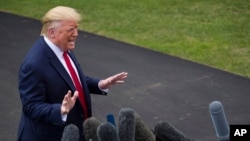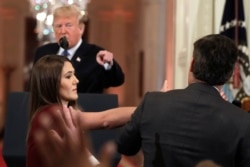The legal pathway to challenge a U.S. president who retaliates against journalists is now a little smoother after a group of First Amendment advocates settled a lawsuit with the U.S. government.
Last month, PEN America reached a settlement with the new administration in a lawsuit it filed against former President Donald Trump.
The resolution upheld a 2020 lower-court ruling affirming the right to sue a president for allegedly using the powers of his or her office to retaliate against unfavorable reporting.
While they may not have had their day in court, those involved in bringing the lawsuit believe the settlement is a positive outcome with long-term impact.
“Of course, we wish we could have gotten a ruling on the merits of this case,” said Kristy Parker, counsel for Protect Democracy and lead counsel for the lawsuit. “But we’re glad the court recognized that revoking press credentials and security clearances to retaliate for coverage violates the First Amendment” to the U.S. Constitution.
David A. Schulz, of the Yale Law School Media Freedom of Information and Access Clinic, said “the settlement by itself does not do much,” but its value is in its validation of the 2020 ruling.
“That is persuasive and will stay on the books,” said Schulz, who was also part of the legal team.
Legal battle
The settlement was the culmination of more than two years of litigation.
In 2018, PEN America, represented by the nonpartisan, nonprofit Protect Democracy, Yale’s Media Freedom of Information and Access Clinic and the law firm Davis Wright Tremaine, filed a lawsuit in the U.S. District Court for the Southern District of New York.
The lawsuit argued that Trump had retaliated against critical coverage by journalists in violation of the First Amendment, which protects freedom of speech and of the press.
"Although the president is free to criticize the press, he cannot use the power and authority of the United States government to punish and stifle it,” the complaint read.
The suit included findings of a PEN America survey of its members, more than half of whom said they believed “public criticism of the [Trump] administration might put them at risk.”
Among its members was CNN correspondent Jim Acosta, whose White House press credentials were temporarily revoked in November 2018 following a heated news conference.
Schulz said the survey and other findings were evidence that Trump was “threatening in ways that was chilling to coverage.” His actions collectively amounted to censorship, Schulz told VOA.
In addition to noting the suspension of press credentials, the lawsuit alleged that Trump or his officials had:
— Revoked or threatened to revoke security clearances for former government officials who engaged in critical public commentary.
— Issued an executive order to raise postal rates to punish Jeff Bezos, CEO of Amazon and owner of The Washington Post.
— Directed Department of Justice actions against media conglomerate Time Warner because of “antagonism” against its subsidiary CNN.
— And threatened to revoke broadcast licenses in retaliation for “coverage the president dislikes.”
The Department of Justice, which represented Trump, sought a dismissal of the complaint, arguing that PEN America could not sue since it was not an injured party and that it had failed to prove Trump impeded press freedom.
"Its allegations of chilled speech and receipt of information are too generalized to support relief: plaintiff has not identified any speaker — a member of plaintiff or not — whose speech has actually been chilled," the DOJ motion filed in April 2019 read.
It also argued that the court lacked the power to control the official, discretionary actions of a sitting president.
The Justice Department declined to comment directly for this article.
The lawsuit was not dismissed but it was curtailed.
In a March 2020 ruling, the district court found the plaintiff did not have standing to sue with respect to several of its claims, but allowed that PEN America, on behalf of its members, could seek redress for First Amendment violations in connection to the revoking, or threatening to revoke, press credentials and security clearances.
Trump’s time in office ran out before further litigation could take place, and the lawsuit was resolved with the incoming administration of President Joe Biden through a settlement agreement.
The agreement stated that the settlement is not an admission of guilt but it preserves the 2020 ruling that favored PEN America.
International impact
Advocates for the case see the lawsuit as a tool to use against abuse of power in the U.S. and overseas.
In the future, explained Nora Benavidez, director of PEN America’s U.S. Free Expression Programs, it will be easier to bring a suit since the court has deemed that PEN America made a viable claim that acts of retaliation by a sitting president violate the First Amendment.
“What I’m proud of is that the case broke new ground,” said Benavidez. “I think the victory here is in the long game, and that legally, we have set a precedent in ways that help bolster a free press for years to come.”
The case has potential to resonate outside the United States as well.
"The world looks to the U.S. when it comes to media freedom,” said Irene Khan, the U.N. special rapporteur on the promotion and protection of the right to freedom of opinion and expression.
“What happened under the Trump administration sent the wrong signal to other countries,” she said. “This will send a positive signal of change.”
Protect Democracy’s Parker hopes others will see an example of how to push back against authoritarian moves. “They’ll see that groups like PEN America stood up and used the courts to push back.”
Not all in the media community, however, saw the lawsuit as an appropriate avenue for mitigating conflicts between the media and the White House.
“The relationship between the president and the press has a legal basis in the Constitution and to the extent possible, both parties should try to have it remain there,” said Lisa Nicole Matthews, president of the National Press Club, via email.
“The law should not be used to resolve disputes like who gets a White House credential or if the president is trying to disadvantage one network over another,” said Matthews, who, speaking on behalf of the club, suggested there are remedies for these issues.
“The press and the president should be able to discuss and resolve their difference,” she said, “and I admit that was quite a challenge with the last administration. But legal remedies are not a solution for the press itself.”






